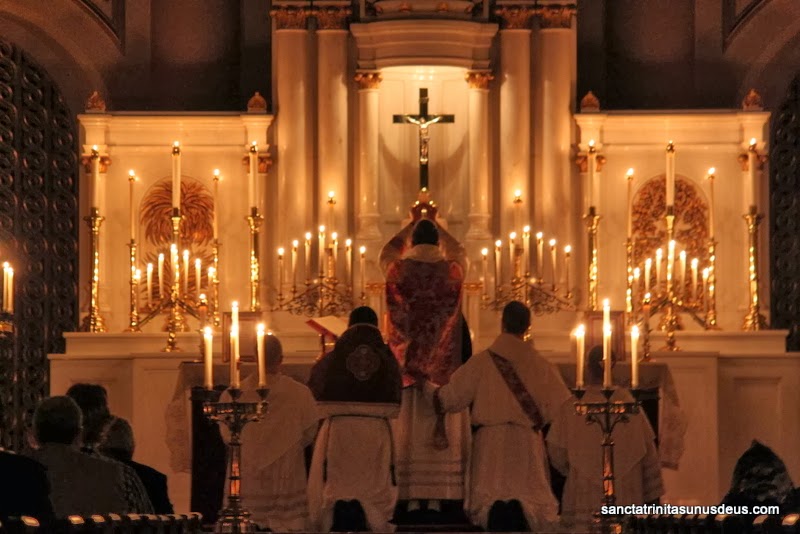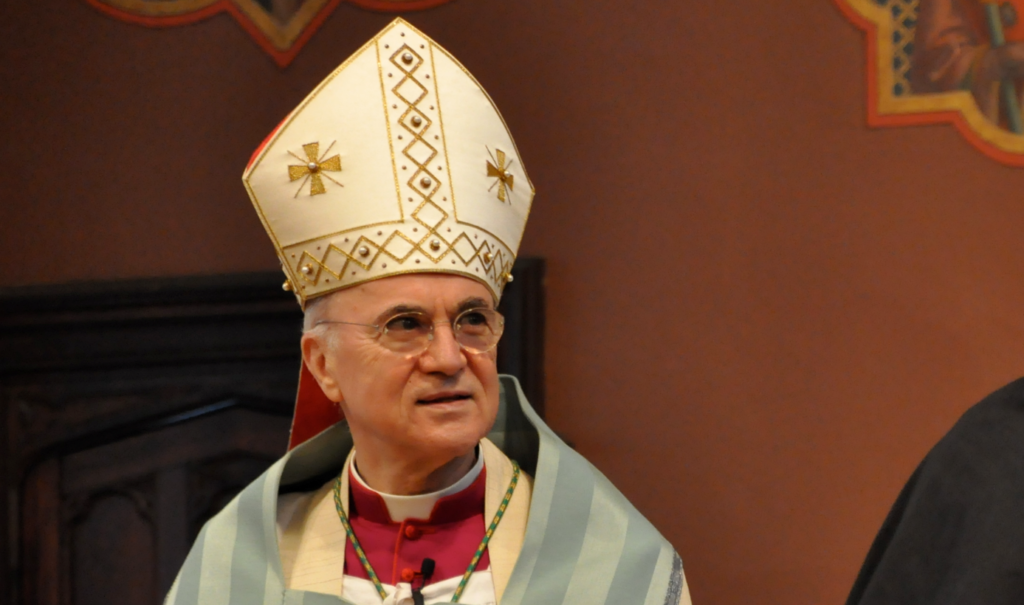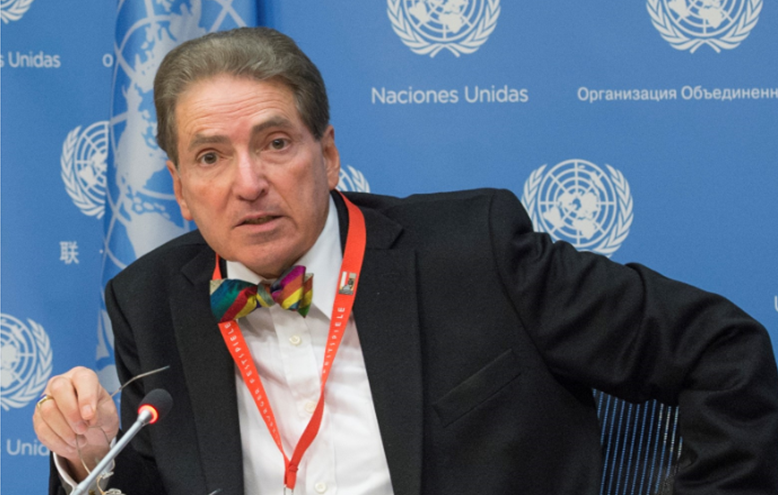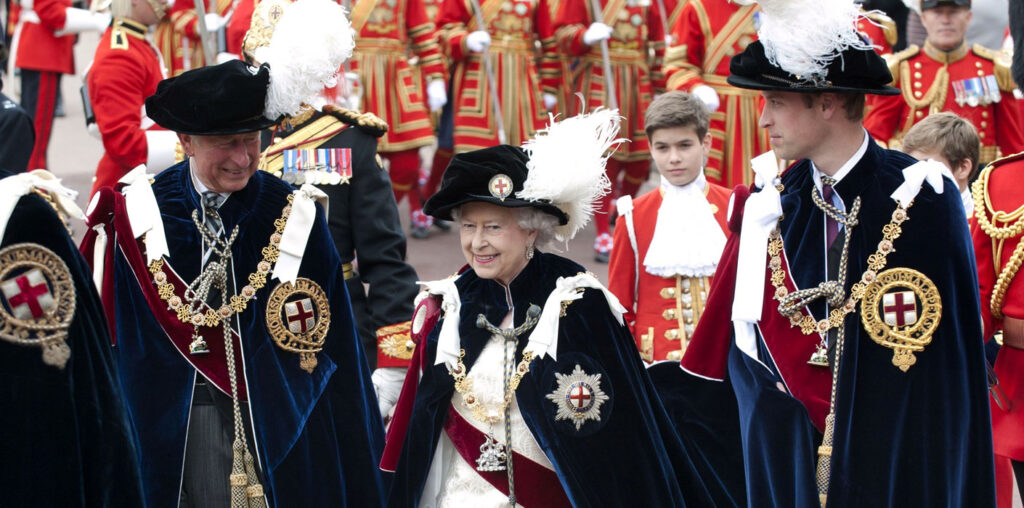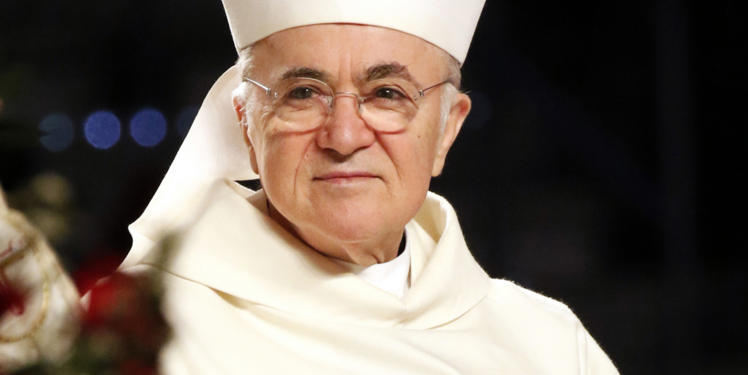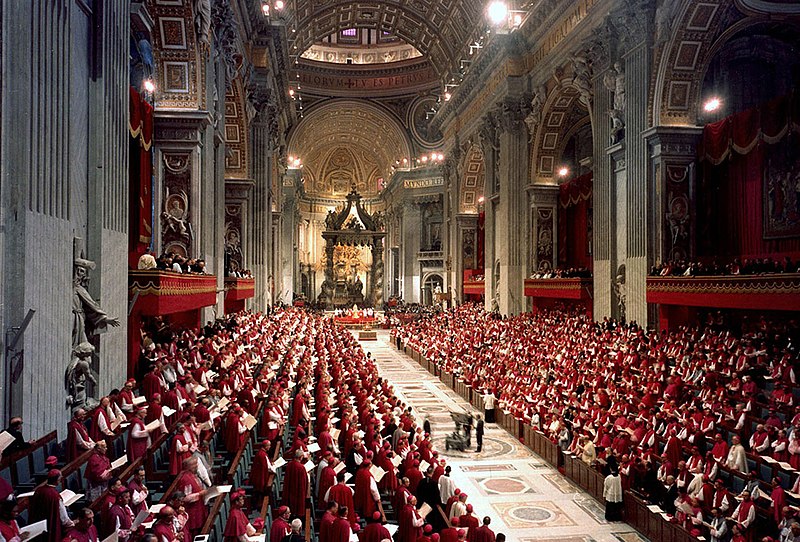By JÖRG WOLLSCHEIDER | In the following statement, the indomitable archbishop calls on priests to disregard the Vatican prohibitions against celebrating the old Tridentine Mass. They essentially live for “God and for the neighbour,” their apostolate is unfruitful if their “own holiness is not cultivated”. Through them, he would be deeply moved by the “serene majesty of the rite, as if he had stepped out of time and into the eternity of God.”
The Council of Trent (1570) carefully reorganised the existing Latin rite of Mass without changing its substance, which goes back to the Last Supper. Rather, the aim was to push back local idiosyncrasies and variations that had developed over the centuries. The Second Vatican Council led primarily to a “Protestantisation” of the Mass and is seen by many as the real cause of the Church’s secularisation and turning away from the eternal truths of the faith and its consequent decline. This observation is undoubtedly correct: wherever the old Mass is celebrated, the churches are overrun with faithful, the parishes flourish and there are many vocations to the priesthood [link, link, link].
Pope Francis’ fight against the Tridentine Mass is paradoxical only for those who do not know the essential background. For example, the Vatican’s high-ranking intelligence officer, Juan Batista Yofre, said in an interview broadcast on 27.11.2017 on the Argentinian television programme “Miranda”: “I am a freemason and Bergoglio is one too” [link, link]. This well-founded suspicion is becoming more and more substantiated, especially since Francis’ church policy actually only plays into the hands of the classical opponents of the faith [link].
Letter from Archbishop Viganò: You who allow yourselves to forbid the Holy Apostolic Mass, have you ever celebrated it?
You who allow yourselves to forbid the Holy Apostolic Mass, have you ever celebrated it? You who, at the height of your liturgical cathedrals, get upset about the “old Mass”, have you ever thought about its prayers, its rites and its ancient and sacred gestures? I have often asked myself this in recent years, because although I knew this Mass from an early age, although I had learned to celebrate it and to respond to the celebrant when I was so small that I still wore boys’ pants, I had almost forgotten and lost it. Introibo ad altare Dei. Kneeling on the freezing cold steps of the altar in winter before I went to school. Sweating on hot summer days under my altar boy robe. I had forgotten that Mass, even though it was the Mass of my ordination to the priesthood on 24 March 1968: a time when one could already perceive the signs of the revolution that shortly afterwards would rob the Church of its most precious treasure and put a counterfeit ritual in its place.
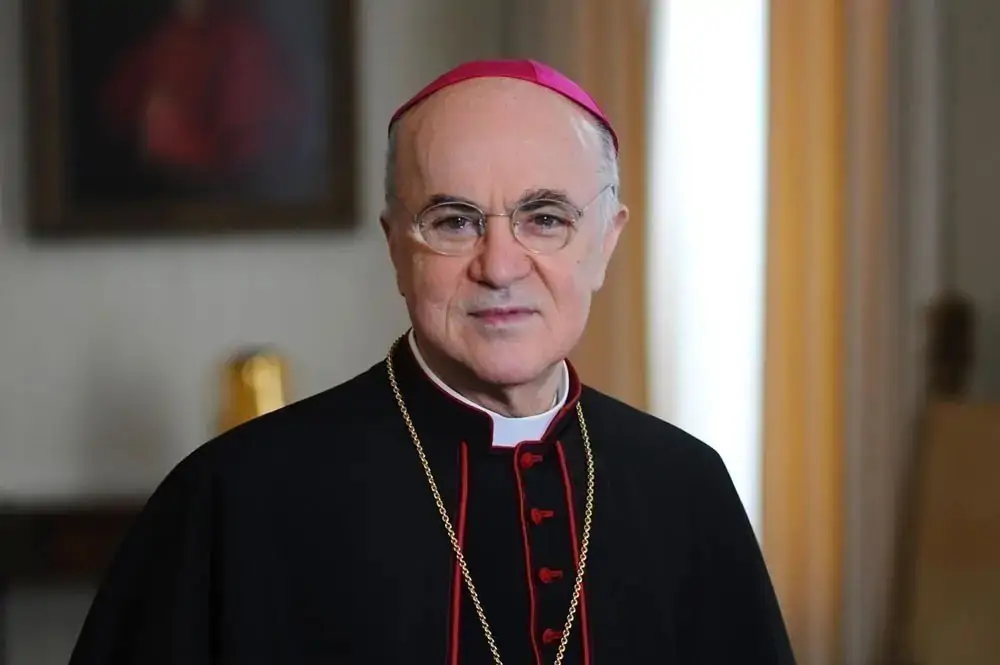
How did the Archbishop rediscover the old Mass for himself?
Well, the Mass, which was abolished and banned by the Council reform in my first years as a priest, remained a distant memory, like the smile of a faraway loved one, the look of a missed relative, the sound of a Sunday with its bells, its friendly voices. But it was something to do with nostalgia, with youth, with the enthusiasm of a time when church obligations were still ahead, when everyone wanted to believe that the world could recover from the aftermath of the Second World War and the threat of communism with a new spiritual momentum. We wanted to believe that economic prosperity could somehow be accompanied by a moral and religious rebirth of our nation [Italy]. Despite the 1968 revolution, the occupations, terrorism, the Red Brigades and the crisis in the Middle East. Thus, amidst the thousand ecclesiastical and diplomatic commitments, the memory had crystallised in my mind of something that in reality remained unresolved, that had been “temporarily” put aside for decades. Something that waited patiently, with the forbearance that only God gives us.
My decision to denounce the scandals of American prelates and the Roman Curia was the occasion that made me look in a different light not only at my role as Archbishop and as Apostolic Nuncio, but also at the soul of that priesthood which service, first in the Vatican and latterly in the United States, had left somewhat incomplete: more for my priesthood than for the ministry. And what I had not understood until then became clear to me through a seemingly unexpected circumstance, when my personal safety seemed to be in danger and I found myself forced against my will to live almost in hiding, far from the palaces of the Curia. At that time, this blessed seclusion, which I now consider a kind of monastic decision, led me to rediscover the Holy Tridentine Mass. I remember very well the day I put on the traditional vestments with the Ambrosian cappino and maniple instead of the chasuble. I remember the fear I felt when, after almost fifty years, I pronounced the prayers of the missal, which reappeared from my mouth as if I had recited them only a short time before. Confitemini Domino, quoniam bonus, instead of the psalm Judica me, Deus of the Roman rite. Munda cor meum ac labia mea. These words were no longer the words of the altar boy or the young seminarian, but the words of the celebrant, the me who was once again, dare I say for the first time, celebrating before the Most Holy Trinity. For while it is true that the priest is a person who essentially lives for others – for God and for neighbour – it is equally true that his apostolate is as barren as a clanging cymbal if he is not aware of his own identity and has not cultivated his own holiness.
I know well that these reflections can leave unmoved or even provoke condescension in those who have never had the grace to celebrate the Mass of all times. But the same thing happens, I imagine, to those who have never fallen in love and who do not understand the enthusiasm and chaste devotion of the beloved to his beloved, or to those who do not know the joy of losing themselves in her eyes. The boring Roman liturgist, the prelate with his tailored clerical suit and his pectoral cross in his pocket, the consultant of the Roman Congregation with the latest copy of Concilium or Civiltà Cattolica in his hand, looks at the Mass of St Pius V with the eyes of an entomologist (the science that deals with insects) who looks at this pericope as closely as a naturalist looks at the veins of a leaf or the wings of a butterfly. Sometimes I even wonder if they don’t do it with the attentiveness of a pathologist cutting open a living body with a scalpel. But when a priest approaches the ancient Mass with a minimum of inner life, whether he has known it before or is discovering it for the first time, he is deeply moved by the serene majesty of the rite, as if he has stepped out of time and into the eternity of God.
One perceives the sacred with the senses
I want to make my confreres in the episcopate and priesthood understand that this Mass is divine by nature because you perceive the sacred with your senses: One is literally taken up into heaven, into the presence of the Most Holy Trinity and the heavenly court, far away from the noise of the world. It is a love song in which the repetition of signs, obeisances and holy words is by no means superfluous, just as a mother never tires of kissing her son or a bride never tires of saying “I love you” to her husband. Everything is forgotten there, because everything that is said and sung there is eternal, all the gestures that are performed there are everlasting, outside of history and yet embedded in a continuum that connects the Cenacle, Calvary and the altar on which the Mass is celebrated. The celebrant does not address the congregation in order to be intelligible, to be nice or to appear topical, but he addresses God: and before God there is only the feeling of infinite gratitude for the privilege of carrying with him the prayers of the Christian people, the joys and sorrows of so many souls, the sins and faults of those who ask for forgiveness and mercy, the gratitude for graces received and the intercessions for our dear departed. One is alone, and at the same time one feels closely connected to an infinite host of souls crossing time and space.
When I celebrate the Apostolic Mass, I think of how, on the same altar consecrated by the relics of the martyrs, so many saints and thousands of priests speak the same words I say, repeat the same gestures, make the same bows and the same genuflections, and wear the same vestments. Above all, we receive Holy Communion with the same Body and Blood of our Lord, to whom we have all been conformed in the offering of the Holy Sacrifice. When I celebrate the Mass of all times, I realise in the most sublime and perfect way the true meaning of what the doctrine teaches us. Acting in persona Christi is not a mechanical repetition of a formula, but the awareness that my mouth utters the same words that the Saviour spoke over the bread and wine in the Upper Room; that when I lift the host and chalice to the Father, I am repeating the sacrifice that Christ made on the Cross; that when I receive Holy Communion, I consume the sacrifice and feed on God Himself, and that I am not partaking of a party. And the whole Church is with me: the triumphant Church, which joins in my supplicating prayer; the suffering Church, which awaits it in order to shorten the souls’ stay in Purgatory; and the militant Church, which strengthens itself in the daily spiritual struggle. But if, as we profess in faith, our mouth is truly the mouth of Christ, if our words at the consecration are truly the words of Christ, if the hands with which we touch the sacred host and chalice are the hands of Christ, what reverence should we have for our bodies and keep them pure and undefiled? What better incentive is there to remain in the grace of God? Mundamini, qui fertis vasa Domini. And in the words of the missal: Aufer a nobis, quæsumus, Domine, iniquitates nostras: ut ad sancta sanctorum puris mereamur mentibus introire.
Priests should try Tridentine Mass, it is for “indomitable spirits, for generous and heroic souls, for hearts burning with love for God and neighbour”.
The theologian will tell me that this is the general teaching, and that the Mass is just that, regardless of the rite, I do not dispute it, reasonably. But whereas the celebration of the Tridentine Mass is a constant reminder of the unbroken continuity of the work of redemption, peppered with saints and blessings, that does not seem to me to be the case with the Reformed rite. When I look at the table versus populum, I see there the Lutheran altar or the Protestant table; when I read the words of institution of the Last Supper in the form of a narrative, I hear the variations of Cranmer’s Common Book of Prayer and Calvin’s service; when I leaf through the Reformed calendar, I find that the same saints that the heretics of the pseudo-Reformation erased. The same is true of the hymns that would horrify an English or German Catholic: When one hears the hymns of those who martyred our priests and trampled on the Blessed Sacrament out of contempt for “papal superstition” under the vaults of a church, one should understand the abyss that exists between the Catholic Mass and its conciliar counterfeit. Not to mention the language: the first to abolish Latin were the heretics, in order to give the people a better understanding of the rites; a people they deceived by denying revealed truth and spreading error. In the Novus Ordo, everything is profane. Everything is instantaneous, everything is accidental, everything is contingent, variable and changeable. There is nothing eternal, for eternity is immutable, just as faith is immutable. Just as God is unchanging.
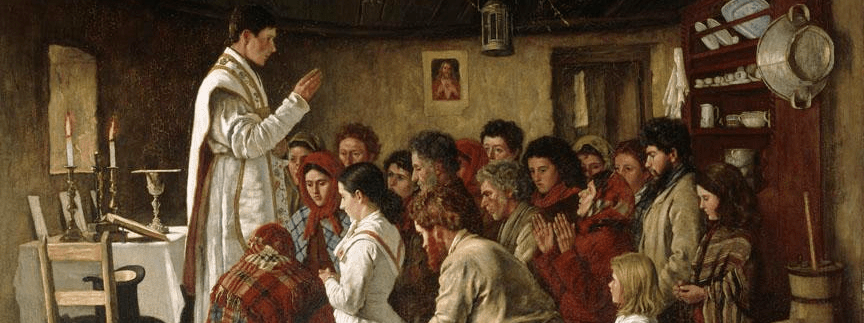
There is another aspect of the traditional Holy Mass that I would like to highlight and which links us to the saints and martyrs of the past. From the times of the catacombs to the most recent persecutions, wherever the priest celebrates the Holy Sacrifice, even in an attic or a cellar, in the woods or in a barn or even in a van, he is in mystical communion with this host of heroic witnesses to the faith, and the gaze of the Most Holy Trinity rests on this improvised altar; before it all the angelic hosts bow down in adoration; all the souls in purgatory look to it. In this, too, above all, each of us understands how tradition creates an indissoluble link between the centuries, not only in the fervent preservation of this treasure, but also in the overcoming of the trials it entails, even unto death. In the face of this thought, the arrogance of the present tyrant with his insane decrees should strengthen us in our fidelity to Christ and make us feel that we are an integral part of the Church of all times, for we cannot win the palm of victory if we are not prepared to fight the bonum certamen.
I want my confreres to dare the unthinkable: I want them to approach the Holy Tridentine Mass not to enjoy the lace of an alb or the embroidery of a chasuble, or on the basis of a purely rational conviction about its canonical legitimacy or the fact that it has never been abolished, but rather with the reverent fear with which Moses approached the burning bush: Knowing that each of us, when we descend from the altar after the last Gospel, is in some way inwardly transfigured because there we have encountered the Holy of Holies. Only there, on that mystical Sinai, can we understand the very essence of our priesthood, which consists above all in offering ourselves to God; a sacrifice of ourselves together with Christ the Sacrifice, for the greater glory of God and the salvation of souls; a spiritual sacrifice which draws its power and strength from the Mass; self-denial to make way for the High Priest; a sign of true humility in the annihilation of one’s own will and surrender to the will of the Father according to the example of the Lord; a gesture of true “communion” with the saints in sharing the same creed and rite. And I would like not only those who have been celebrating the Novus Ordo for decades to have this “experience”, but above all the young priests and those who exercise their ministry in the front line: The Mass of St Pius V is for indomitable spirits, for generous and heroic souls, for hearts burning with love for God and neighbour.
I know very well that the life of priests today consists of a thousand trials, of stress, of feeling alone in the struggle against the world, of disinterest and ostracism by superiors, of a slow attrition that distracts from reflection, from inner life and from spiritual growth. And I know very well that this feeling of being besieged, of feeling like a sailor who is alone and has to steer a ship through a storm, is not the prerogative of the traditionalists or the progressives, but the common fate of all those who have offered their lives to the Lord and to the Church, each with his own misery, with economic problems, misunderstandings with the bishop, criticism from confreres, as well as the petitions of the faithful. And also those hours of solitude when the presence of God and the companionship of the Virgin Mary seem to disappear, as in the dark night of St. John of the Cross. Quare me repulisti? Et quare tristis incedo, dum affligit me inimicus? When the demon insidiously wriggles between the internet and the television, quærens quem devoret, and takes advantage of our weariness by betraying us. In these cases, which we all face, like our Lord in Gethsemane, it is our priesthood that Satan wants to attack, presenting himself convincingly like Solomé before Herod and asking us for the gift of the Baptist’s head. Ab homine iniquo, et doloso erue me. In trial we are all equal: for the victory which the enemy seeks to win is not only over the poor souls of the baptised, but over Christ the priest whose anointing we bear.
Tridentine Mass the only lifeline of the priesthood
For this reason, today more than ever, the Holy Tridentine Mass is the only lifeline of the Catholic priesthood, for in it the priest is reborn every day in that privileged time of intimate union with the Most Holy Trinity, and draws from it indispensable graces to avoid falling into sin, to progress along the path of holiness and to rediscover the healthy equilibrium with which to face his ministry. Those who believe that all this can be resolved as a purely ceremonial or aesthetic question have understood nothing of their own priestly vocation. For the Holy Mass “of all times” – and that is what it really is, however it has always been opposed by the adversary – is not a docile mistress who offers herself to everyone, but a jealous and chaste bride, as jealous as the Lord Himself.
Do you want to please God or the one who keeps you away from him? Basically, it is always about this question: the choice between the gentle yoke of Christ and the chains of slavery of the adversary. The answer will seem clear to you the moment you too, marvelling at this immense treasure hidden from you, discover what it means to celebrate the Holy Sacrifice not as pathetic “overseers of the assembly” but as “ministers of Christ and dispensers of the mysteries of God” (1 Cor 4:1).
Take the missal in hand, ask a priest friend to help you and climb the mountain of the Transfiguration: Emitte lucem tuam et veritatem tuam: ipsa me deduxerunt, et adduxerunt in montem sanctum tuum, et in tabernacula tua. Like Peter, James and John, you too will exclaim: Domine, bonum est nos hic esse – “Lord, it is good that we are here” (Mt 17:4). Or, in the words of the Psalmist, repeated by the celebrant at the offertory: Domine, dilexi decorem domus tuæ, et locum habitationis gloriæ tuæ.
Once you have discovered it, no one will be able to take from you that by which the Lord no longer calls you servants but friends (Jn 15:15). No one will ever be able to persuade you to renounce it, and force you to be content with the adulteration put into the world by rebellious minds. Eratis enim aliquando tenebræ: nunc enim lux in Domino. Ut filii lucis ambulate. “For once you were darkness, but now you are light in the Lord. Walk therefore as children of light” (Eph 5:8). Propter quod dicit: Surge qui dormis, et exsurge a mortuis, et illuminabit te Christus. “Therefore saith he, Awake, thou that sleepest, and arise from the dead, and Christ shall enlighten thee” (Eph 5:14).
+ Carlo Maria Viganò, Archbischof, 2nd of January 2022, link

